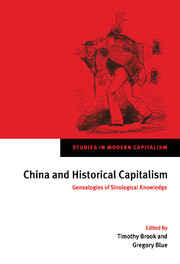Book contents
- Frontmatter
- Contents
- Preface
- Major dynastic periods in China's history
- 1 Introduction
- 2 The West, capitalism, and the modern world-system
- 3 China and Western social thought in the modern period
- 4 Capitalism and the writing of modern history in China
- 5 Towards a critical history of non-Western technology
- 6 The political economy of agrarian empire and its modern legacy
- Bibliography
- Index
2 - The West, capitalism, and the modern world-system
Published online by Cambridge University Press: 22 September 2009
- Frontmatter
- Contents
- Preface
- Major dynastic periods in China's history
- 1 Introduction
- 2 The West, capitalism, and the modern world-system
- 3 China and Western social thought in the modern period
- 4 Capitalism and the writing of modern history in China
- 5 Towards a critical history of non-Western technology
- 6 The political economy of agrarian empire and its modern legacy
- Bibliography
- Index
Summary
If one wonders what is the “sense” of their endless chase, why [businessmen] are never satisfied with what they have, and thus inevitably seem to act in senseless ways in terms of any purely worldly approach to life, they would occasionally respond, if they knew how to answer at all: “to provide for my children and grandchildren.” But, that argument not being peculiar to them but working just as well for the traditionalist, they would be more likely to respond in a simpler, most exact fashion, that business with its constant work had become “indispensable to their life.” That is in fact the only accurate explanation and brings out what is so irrational in this lifestyle from the point of view of personal happiness, that a man exists for his business, and not the other way around
(Weber 1947: 54).The Rise of the West?
The West, capitalism, and the modern world-system are inextricably linked together – historically, systemically, intellectually. But exactly how, and why? This is a question on which there has been little consensus up to now, and there is indeed less and less.
The imbrication of the three concepts (three realities?) reached its apogee in the nineteenth century. But how even do we delimit this nineteenth century? – 1815–1914? or 1789–1917? or 1763–1945? or even 1648–1968?
- Type
- Chapter
- Information
- China and Historical CapitalismGenealogies of Sinological Knowledge, pp. 10 - 56Publisher: Cambridge University PressPrint publication year: 1999
- 8
- Cited by



